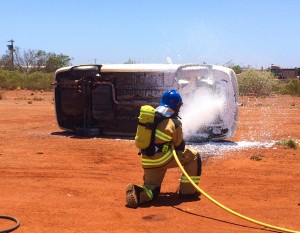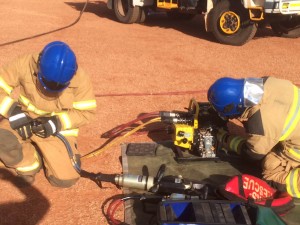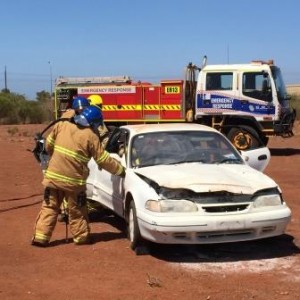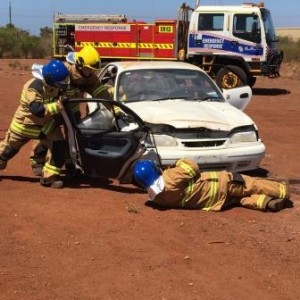Providing emergency response services in an economic downturn.
The race to the bottom!
Scott Houston – CEO of Executive Risk Solutions (ERS).
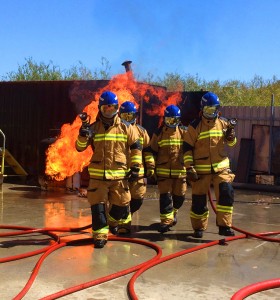 Executive Risk Solutions is a leading provider of emergency services in the resources and private sectors. ERS was the recipient of the 2015 Telstra Business of the Year Award. In this article Scott Houston challenges the current round of cost cutting as inappropriately targeting essential services such as Emergency Responders and Paramedics.
Executive Risk Solutions is a leading provider of emergency services in the resources and private sectors. ERS was the recipient of the 2015 Telstra Business of the Year Award. In this article Scott Houston challenges the current round of cost cutting as inappropriately targeting essential services such as Emergency Responders and Paramedics.
It may seem that the last three years have seen endless cost-cutting, rationalisation and redundancies. Commodity and product prices have hit many companies hard and in striving to remain competitive and viable, hard decisions have had to be made. Direct requests to contractors and sub-contractors for savings and options for discounts has become part of doing business.
It is in these hard decisions I believe the key decision makers need to be mindful of what the real cost really is when reviewing their 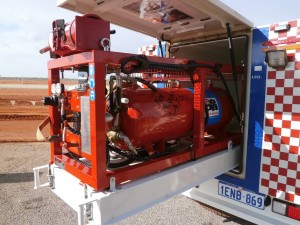 emergency response services. Services perceived to be there only for when something goes wrong or, in many instances, to meet project approvals and statutory requirements are often the first to be reassessed. Many project and resource company sites are now left with a basic service that, on closer inspection, is nowhere near what their risk profile demands. After all, price reductions and rationalisation does not correlate with a reduction in incidents requiring an emergency response. The operational risks remain and, in many cases, increase during these periods of contraction where productivity and efficiency drives a ‘bottom line’ approach to business survivability.
emergency response services. Services perceived to be there only for when something goes wrong or, in many instances, to meet project approvals and statutory requirements are often the first to be reassessed. Many project and resource company sites are now left with a basic service that, on closer inspection, is nowhere near what their risk profile demands. After all, price reductions and rationalisation does not correlate with a reduction in incidents requiring an emergency response. The operational risks remain and, in many cases, increase during these periods of contraction where productivity and efficiency drives a ‘bottom line’ approach to business survivability.
Given the current economic downturn companies are again looking for cost savings at every turn and subcontractors are being pressured to deliver these savings. Some say it is the normalisation after the resource boom, and in several areas I couldn’t agree more. We have been in an industry where people have been in the ‘dash for cash’, where labour – skilled and unskilled, have been able to secure impressive pay packets working in the resources sector. With this ‘dash’ now over the decisions being made in the area of emergency services should be scrutinised carefully.
An area of inquiry for the bean counters influencing funding decisions is identifying the hidden costs. Safety of personnel through substandard emergency response services will inadvertently cost companies big dollars and even the loss of lives in preventable situations. Quality emergency response is leveraged off highly effective prevention and preparedness activities – underrated and often intangible elements of a holistic risk management regime.
These circumstances can lead to a race to the bottom.
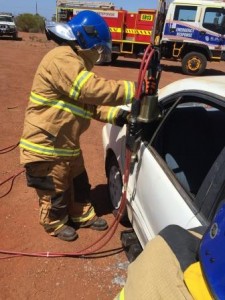 This is where unprincipled sub-contracting companies fighting for scarce service contracts forget about the quality of labour they put on a site. These contractors will neglect the quality of service that is necessary to deliver their essential services in often hostile environments. It can become just a box ticking exercise, meeting the minimum requirement for the cheapest price possible. Is the focus on the minimum standard for the cheapest price really the sort of workforce that companies want on their projects?
This is where unprincipled sub-contracting companies fighting for scarce service contracts forget about the quality of labour they put on a site. These contractors will neglect the quality of service that is necessary to deliver their essential services in often hostile environments. It can become just a box ticking exercise, meeting the minimum requirement for the cheapest price possible. Is the focus on the minimum standard for the cheapest price really the sort of workforce that companies want on their projects?
Executive Risk Solutions provides a range of emergency services in the sector, including Emergency Response, Security and Medical services. We too have felt the pressure to reduce costs the same as everyone else. We are working hard to find the balance where we can staff positions with the best people for the right price whilst also looking for other efficiency and value for clients.
Are we the cheapest in the market? No.
Are we the most expensive in the market? No.
Are we the best in the market? Yes! Sorry if that sounds a little arrogant but we have the personnel and the track record to prove it, and we invest in our people and our products to ensure continuous improvement.
Let me give you a couple of examples based on one of our projects in the Pilbara. Two recent incidents we have responded to involved serious road crashes with people trapped in vehicles. This is when a properly trained and resourced crew is essential. Wasted minutes, poor techniques and inferior equipment will cost lives.
In the first incident the ERS crew arrived at a scene outside of our area of responsibility to assist with an accident on a public road. Another emergency team from an adjacent site were on the scene as they were closer to site of the accident. The ERS crew found an emergency crew completely unprepared for the task required to extricate the injured party (IP). They had prepared their road crash rescue equipment to cut out the trapped occupant of a light vehicle however their team did not have the experience or skills to extract the injured party out of the car. These wasted minutes can be crucial in a motor vehicle accident. Although our team had reason to be frustrated and angry due to a lack of the required immediate actions by the other team, they quickly went about the task of extracting the IP and loaded him into the waiting helicopter to be flown to hospital.
In the second instance there was a head on collision between a truck and a light vehicle. The ERS crew responded to the request for assistance from a nearby site and arrived first and went to work initiating the extraction of a seriously injured person from the light vehicle. The driver of the truck was also trapped and injured but the team explained to him that their priority was to the badly injured driver of the other vehicle and he would have to wait whilst being supported by an ERS team member. A simultaneous extraction was not possible so it was a welcome sight for the ERS supervisor to see another site’s emergency team arrive. They were quickly tasked with extracting the truck driver by the ERS supervisor. Shortly after being tasked they came down to the light vehicle scene to ask if they could borrow the ERS Road Crash Rescue tools and if we could carry them up to the location of the truck. Emergency response is about being prepared and trained to carry out services that can be reasonably expected to occur. It is shameful to have an emergency response service essentially undertaking a box-ticking exercise instead of providing the correct equipment and expertise for a potentially lifesaving task cannot be performed. Where is the cost saving in such a situation?
These are two recent examples where we have seen cost cutting result in the hiring of inexperienced personnel in roles that they are not equipped or trained to do. Yes, there is room for inexperienced people to enter the industry; however it needs to be under the guidance of an experienced supervisor as part of an experienced team. This should include procedures for verification of competencies and continual training and development.
In the mining and resource sector they do not cut corners and save money by running re-tread tyres or putting cheaper grade oil into their machinery. So why is it that they see fit to do the equivalent in the field of emergency management? We believe it is a short sighted attempt to save money by using inferior staff and equipment only to find that their inability to deliver a first rate service will end up costing a great deal more. A quote from a 2014 Safe Work Australia Report highlights the costs of that inability to deliver
“Economists have also sought to estimate the marginal costs associated with work related death. Using Australian data, Miller, Mulvey and Norris (1997) estimate the economic cost associated with a work-related death to be between $A11 million and $A19 million.”
Large corporations don’t cut corners when it comes to their finances and securing their money, but for some reason the same doesn’t apply when it comes to protecting their people. Let’s look at the big four accounting and audit firms, Deloitte, Ernst and Young, Price Waterhouse Coppers and KPMG. Now I am fairly sure that there are smaller accounting firms that will work at cheaper rates however these four control approximately 80% of the market. The reason they have such dominance in the market is because they are reliable, professional and responsive to their clients’ needs. Above all they make it easy for their clients. The clients see value in paying the required rates because they want peace of mind that the job is done correctly and there is a recognised cost benefit to doing this correctly for any company. Again, I would pose the question as to why is it the case that when it comes to Emergency and Medical services for their people companies openly look for the cheapest quoted labour using minimal resources and standards? Companies willingly pay the higher fees to look after their money however look to save money when it comes to caring for their staff. Is that the message we should take from this? Apparently so.
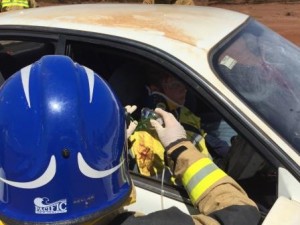 Will clients only realise the implications after there has been mismanagement of an emergency or mistreatment of a medical case that results in something as severe as a fatality. Will it only become obvious when the shortfalls are pointed out in the coroner’s court?
Will clients only realise the implications after there has been mismanagement of an emergency or mistreatment of a medical case that results in something as severe as a fatality. Will it only become obvious when the shortfalls are pointed out in the coroner’s court?
Many companies within the industry have a heavy reliance on volunteer teams, members of their work force who hold other roles within the company. In an emergency they will then leave their normal duties to undertake an emergency response or medical role. Now the volunteer teams are a tremendous asset for any organisation and greatly enhance the overall capability if used correctly. However in my opinion they should be viewed as a supplementary service and should not be seen as a way of forfeiting the need for a full time service that is focused on delivering a lifesaving service 24/7. Hands on real time experience cannot be replaced with training courses and minimal exposure to actual incidents. If it’s your father, brother, mother or sister on a remote site that is having CPR/EAR performed on them due to an incident, do you want the person who is trained on CPR/EAR and doing it for the first time or the person who is trained and experienced and has done multiple times working on your loved one?
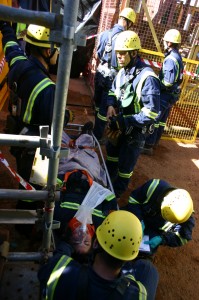 There is no denying the need for a volunteer team and no one should denigrate their commitment or efforts. They are generally great people with a desire to help others and this is to be encouraged. In my own experience I have witnessed these people perform a fantastic service to their community country and workplaces in positions such as volunteer Emergency Response Teams or Medics, Volunteer Fire Fighters, Paramedics and Defence Reservists. However their deployment and use needs to be well thought through and their capability fully understood. You don’t find the Government sending an Army Reserve unit off to conduct a task more suitable to the Special Air Service Regiment. Fit for purpose needs to be a greater consideration within our resource industry.
There is no denying the need for a volunteer team and no one should denigrate their commitment or efforts. They are generally great people with a desire to help others and this is to be encouraged. In my own experience I have witnessed these people perform a fantastic service to their community country and workplaces in positions such as volunteer Emergency Response Teams or Medics, Volunteer Fire Fighters, Paramedics and Defence Reservists. However their deployment and use needs to be well thought through and their capability fully understood. You don’t find the Government sending an Army Reserve unit off to conduct a task more suitable to the Special Air Service Regiment. Fit for purpose needs to be a greater consideration within our resource industry.
Our resources industry from iron ore and gold to oil and gas operate is some of the most remote and hostile environments in Australia and around the world. When things do go wrong and the nearest other Emergency Response Team may be one or two hours away and medical evacuation or advanced treatment as much as eight hours away. Do you really want to rely on the cheapest labour possible? Is that when you want to realise that your sub-contractor or under trained volunteer team just can’t deliver?
If you are working in a remote area, or in a high risk job take the time to consider just who it is that your company will turn to when things go wrong. Consider if that person is the one that you want in your time of need and it’s your right to understand just what is in place to assist you, it may be all you have.
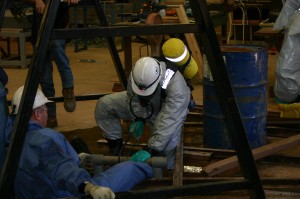 If you are responsible for sourcing these teams consider the implications of going for an option based wholly on price. Don’t shortcut the process and make sure you interrogate the potential service provider to ensure they really can deliver and that they have delivered in the past! It’s your responsibility to ensure that you pay the right price for the service but more importantly it is your responsibility to put the best service in place for your colleagues. Is the cheapest provider really the best for the job? I don’t know of a single resource company that does not have the safety of their staff as one of their key values or concerns. Can a company really uphold those values when they make large profits yet use the cheapest contractor they can find to deliver emergency and medical services? Just how much do they value their people?
If you are responsible for sourcing these teams consider the implications of going for an option based wholly on price. Don’t shortcut the process and make sure you interrogate the potential service provider to ensure they really can deliver and that they have delivered in the past! It’s your responsibility to ensure that you pay the right price for the service but more importantly it is your responsibility to put the best service in place for your colleagues. Is the cheapest provider really the best for the job? I don’t know of a single resource company that does not have the safety of their staff as one of their key values or concerns. Can a company really uphold those values when they make large profits yet use the cheapest contractor they can find to deliver emergency and medical services? Just how much do they value their people?
The industry seems to be in a race to the bottom, they are focused on undercutting their competition without regard for the standard of service they can deliver. We all know the saying “if you pay peanuts you get monkeys” but for some reason the industry quickly reverts to paying peanuts and employing monkeys!
Quality and experienced emergency responders will attract higher wages and conditions however you definitely get what you pay for. As professionals in the emergency service world we should be focused on upholding the standards, paying staff what they deserve, working to save lives and delivering value through best practice. Contracts should be won on your ability to deliver an exceptional standard, not the cheapest price! The race to the bottom is not helping anyone, especially our future clients and patients.


